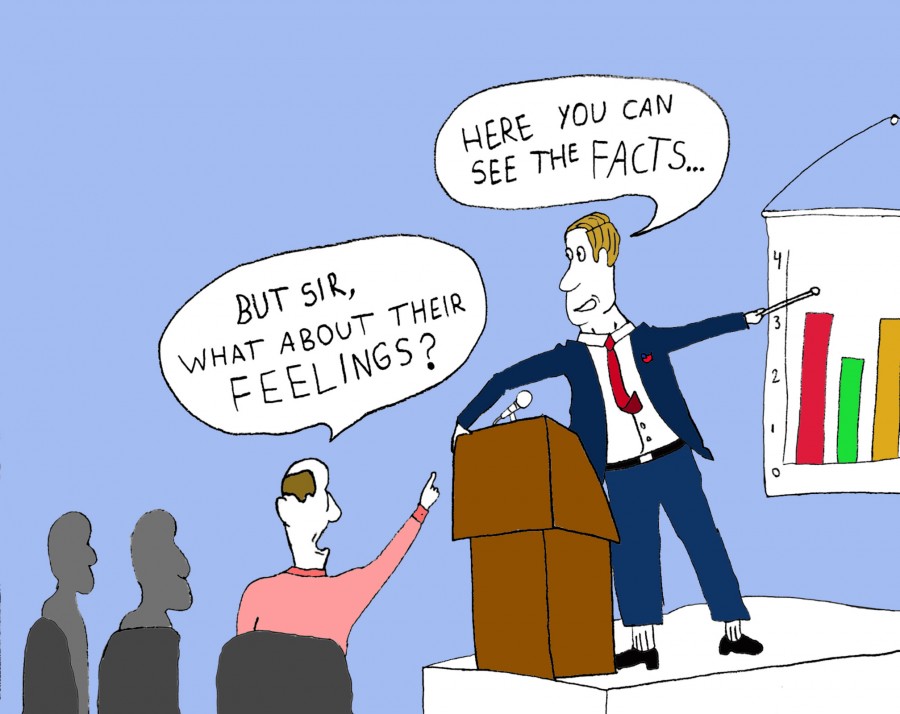Facts trump feelings
Before writing this column I would like to establish one thing: I am a journalist and I deal with facts.
What I am about to write is not going to be politicized or adjusted for the possibility that it may be “offensive” or labeled a “microaggression” or whatever word the liberal crowd has created.
Free speech is a right, not a privilege of a special, pre-determined group. Minorities, women or any other group that has historically been discriminated against, bears no right in claiming that other groups who are not exactly like them have the right to say certain statements that could be labeled “offensive.” The truth is the truth regardless of who speaks it.
I’ve written about political correctness before but it deserves to be repeated: society has become far too sensitive for it to be healthy. Many liberals have great influence on teenagers, most especially those who lack any real guidance in the political realm. Liberals tend to hold more sway because their tactics are pure sophistry that rely on emotion. Facts are no longer the foremost way to win an argument.
In any discussion about any political or social issue, whether it be gay marriage, abortion or gun control, liberals resort to character attacks rather than addressing the issue at hand. The minority groups of United States society have found it to be their special privilege to end all honest discussion about facts or issues by simply saying, “You’ve hurt my feelings.” Or any other variety of responses that effectively end any type of logical and coherent discussion: “You’re a racist/homophobe/bigot.”
Debate is centered around facts, not feelings. Accusations about one’s character, such as: “You don’t care about the death of the children and college students if you don’t believe in gun control” are superfluous and quite frankly, bully tactics.
I worry about the emotional response you may have if you are my friend or family member. But in a discussion about politics, regardless of who you are, one’s feelings are useless in a discussion. Facts and evidence are what matter. I don’t care who you are, or what you represent, all I care about is your opinion and solution to an issue, and what evidence you have to back that up.
Once you label me homophobic for believing gay marriage should not be recognized by the government, or a woman-hater for being pro-life, then you have lost the argument. I do in fact, have a right to voice my opinion, on anything. Once you stray away from any actual arguments and attempt to shut me up because I’m a “bad” person, you have made sure the debate is futile.
Ideological fascism has taken a hold over many in this country, especially in educational settings. Regardless of what some may say, I do not have to be gay to understand what is homophobic and what is not, I do not have to be a minority to understand what racism is. That is one of the many lies that is being promoted among myself and my peers.
If someone’s opinion makes you feel marginalized and you decide to voice that marginalization rather than combat the opinion with contrary evidence, then I would suggest you read the First Amendment a few times and rethink how you present yourself. People disagree, and that is the beauty of discussion. So do not try and take away that right by spouting ad hominem attacks or citing “white privilege” trying to effectively eliminate that person’s opinion altogether.
So next time you meet someone who believes their feelings should be considered as fact and is thus necessary to a debate, politely reframe the discussion and choose to focus on facts.

Emma is the Executive Editorial Page Editor at The Sidekick. She enjoys politics, writing and traveling.




andrea • Feb 18, 2016 at 2:53 pm
For a person who seeks facts and argues with facts, where are the facts to this? “THE MINORITY groups of United States society have found it to be their special privilege to end all honest discussion about facts or issues by simply saying, “You’ve hurt my feelings.” Or any other variety of responses that effectively end any type of logical and coherent discussion: “You’re a racist/homophobe/bigot.”
I suggest for you to not generalize, it may lead to a misunderstanding . Secondly facts and emotions are always a part of decision making , as a varsity debater I know. In debate you need logos, pathos, and ethos to convince someone to take a particular stance on an issue. The topic is interesting but next time don’t be a hypocrite, do not take this as an attack but a suggestion.